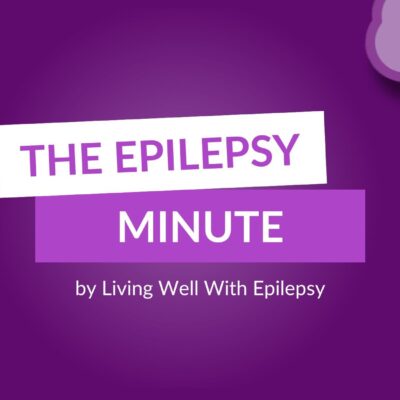This blog post is sponsored by SK Life Science, Inc.
 Living with epilepsy is a journey full of unknowns. For Shannon, a father from Louisiana, those unknowns brought fear, loss of independence, and emotional challenges. But through resilience, advocacy, and support, he’s found hope and a new path forward.
Living with epilepsy is a journey full of unknowns. For Shannon, a father from Louisiana, those unknowns brought fear, loss of independence, and emotional challenges. But through resilience, advocacy, and support, he’s found hope and a new path forward.
From Confusion to Diagnosis: Living With Epilepsy
Shannon’s epilepsy journey began with unrecognized symptoms when he started to experience seizures that surfaced while working at the airport, where he serves as a terminal superintendent. As a social and active guy, Shannon brushed off the early signs of epilepsy until he was involved in an accident that served as a wake-up call.
His first encounter with a neurologist left him feeling dismissed. “There were no tests run,” Shannon recalls. “It was almost like he was doubting in his mind what I was feeling.” Encouraged by friends, he sought a second opinion—and that’s when everything changed. With the help of a new doctor, Shannon learned that he had epilepsy and that it was triggered by fatigue and stress, two factors he could finally begin to manage.
The Impact on Everyday Life
Being diagnosed meant giving up many of the freedoms Shannon had taken for granted, especially driving. Relying on coworkers to get to and from work was more than inconvenient; it felt like a loss of autonomy. Even more painful was the emotional impact on his children.
One of Shannon’s favorite things to do was taking his daughters out to dinner so that they could connect and give mom some free time. However, after his diagnosis, his wife didn’t want him to drive a car alone or with his daughters, so it was a harsh new reality for him to grasp.
Witnessing his seizures was scary for his kids. “You’re supposed to be the strong one,” he says. “But when you’re going through something like that, it’s hard to look strong in front of your kids when inside you’re not.”
Finding the Right Treatment
For Shannon, the goal was always clear: work towards a seizure-free life. But after trying two medications that didn’t work, he felt skeptical when his neurologist recommended XCOPRI® (cenobamate tablets) CV, a prescription medication approved for the treatment of partial-onset seizures in adults 18 and older.
“My first thought was, ‘Is this just another drug we’re going to add that’s not going to work?’” Shannon admits. He also hoped to reduce side effects by cutting back on at least one of his existing medications.
Although doctors couldn’t remove any medications at the time due to the severity of his episodes, adding XCOPRI made a noticeable difference for him. “I noticed there was a significant reduction in my episodes,” he says. “I was hopeful that I could get my life back.”
Like any medication, XCOPRI has risks and benefits. Do not take XCOPRI if you are allergic to it or have a genetic problem (called familial short QT syndrome) that affects the electrical system of the heart. XCOPRI can have serious side effects including serious allergic reaction which may affect organs and other parts of your body like the liver or blood cells. XCOPRI can cause liver problems, tell your doctor right away if you have any symptoms of liver problems including: yellowing of the skin and eyes (jaundice), nausea, vomiting, unusual darkening of the urine, or feeling tired or weak. XCOPRI may cause problems with the electrical system of the heart (QT shortening). Antiseizure drugs, including XCOPRI, may cause suicidal thoughts or actions in a very small number of people, about 1 in 500. Call your doctor right away if you have suicidal thoughts or actions, or new or worsening depression, anxiety, or irritability. XCOPRI may cause problems that affect your nervous system, including dizziness, trouble walking or with coordination, feeling sleepy and tired, trouble concentrating, remembering and thinking clearly, and vision problems. Do not drive, operate heavy machinery, or do other dangerous activities until you know how XCOPRI affects you.
These are not all of XCOPRI’s side effects. We encourage you to read the Important safety information included at the end of this article.
Why Support is Paramount
Shannon’s story stresses the importance of not facing epilepsy alone. Opening up can be difficult, but it can have a lasting, positive impact for those with epilepsy.
For Shannon, the turning point was building a strong support system – one that included a compassionate medical team, friends who kept him motivated, and the deep love he has for his children. Having that kind of support, he believes, makes it much easier to handle the daily challenges of living with epilepsy.
To learn more about Shannon and his story, click here. To learn more about XCOPRI, visit www.xcopri.com and talk to your doctor.
IMPORTANT SAFETY INFORMATION and INDICATION for XCOPRI® (cenobamate tablets) CV
DO NOT TAKE XCOPRI IF YOU:
· Are allergic to cenobamate or any of the other ingredients in XCOPRI.
· Have a genetic problem (called Familial Short QT syndrome) that affects the electrical system of the heart.
XCOPRI CAN CAUSE SERIOUS SIDE EFFECTS, INCLUDING:
Allergic reactions: XCOPRI can cause serious or life threatening skin rash or other serious allergic reactions which may affect organs and other parts of your body like the liver or blood cells. You may or may not have a rash with these types of reactions. Call your healthcare provider right away
and go to the nearest emergency room if you have any of the following: swelling of your face, eyes, lips, or tongue, trouble swallowing or breathing, a skin rash, hives, fever, swollen glands, or sore throat that does not go away or comes and goes, painful sores in the mouth or around your eyes, yellowing of your skin or eyes, unusual bruising or bleeding, severe fatigue or weakness, severe muscle pain, frequent infections, or infections that do not go away. Take XCOPRI exactly as your healthcare provider tells you to take it. It is very important to increase your dose of XCOPRI slowly, as instructed by your healthcare provider.
QT shortening: XCOPRI may cause problems with the electrical system of the heart (QT shortening). Call your healthcare provider if you have symptoms of QT shortening including fast heartbeat (heart palpitations) that last a long time or fainting.
Suicidal behavior and ideation: Antiepileptic drugs, including XCOPRI, may cause suicidal thoughts or actions in a very small number of people, about 1 in 500. Call your healthcare provider right away if you have any of the following symptoms, especially if they are new, worse, or worry you: thoughts about suicide or dying; attempting to commit suicide; new or worse depression, anxiety, or irritability; feeling agitated or restless; panic attacks; trouble sleeping (insomnia); acting aggressive; being angry or violent; acting on dangerous impulses; an extreme increase in activity and talking (mania); or other unusual changes in behavior or mood.
Liver problems: XCOPRI may cause liver problems. Your healthcare provider will do blood tests to check your liver before you start XCOPRI and while you take XCOPRI if needed. Tell your healthcare provider right away if you have any symptoms of liver problems, such as: yellowing of the skin and eyes (jaundice), nausea, vomiting, unusual darkening of the urine, or feeling tired or weak.
Nervous system problems: XCOPRI may cause problems that affect your nervous system. Symptoms of nervous system problems include: dizziness, trouble walking or with coordination, feeling sleepy and tired, trouble concentrating, remembering, and thinking clearly, and vision problems. Do not drive, operate heavy machinery, or do other dangerous activities until you know how XCOPRI affects you.
Do not drink alcohol or take other medicines that can make you sleepy or dizzy while taking XCOPRI without first talking to your healthcare provider.
DISCONTINUATION:
Do not stop taking XCOPRI without first talking to your healthcare provider. Stopping XCOPRI suddenly can cause serious problems. Stopping seizure medicine suddenly in a patient who has epilepsy can cause seizures that will not stop (status epilepticus).
DRUG INTERACTIONS:
XCOPRI may affect the way other medicines work, and other medicines may affect how XCOPRI works. Do not start or stop other medicines without talking to your healthcare provider. Tell healthcare providers about all the medicines you take, including prescription and over-the-counter medicines, vitamins and herbal supplements.
PREGNANCY AND LACTATION:
XCOPRI may cause your birth control medicine to be less effective. Talk to your healthcare provider about the best birth control method to use.
Talk to your healthcare provider if you are pregnant or plan to become pregnant. It is not known if XCOPRI will harm your unborn baby. Tell your healthcare provider right away if you become pregnant while taking XCOPRI. You and your healthcare provider will decide if you should take XCOPRI while you are pregnant. If you become pregnant while taking XCOPRI, talk to your healthcare provider about registering with the North American Antiepileptic Drug (NAAED) Pregnancy Registry. The purpose of this registry is to collect information about the safety of antiepileptic medicine during pregnancy. You can enroll in this registry by calling 1-888-233-2334 or go to www.aedpregnancyregistry.org.
Talk to your healthcare provider if you are breastfeeding or plan to breastfeed. It is not known if XCOPRI passes into breastmilk. Talk to your healthcare provider about the best way to feed your baby while taking XCOPRI.
COMMON SIDE EFFECTS:
The most common side effects in patients taking XCOPRI include dizziness, sleepiness, headache, double vision, and feeling tired.
These are not all the possible side effects of XCOPRI. Tell your healthcare provider if you have any side effect that bothers you or that does not go away. For more information, ask your healthcare provider or pharmacist. Call your doctor for medical advice about side effects. You may report side effects to FDA at 1-800-FDA-1088 or at www.fda.gov/medwatch.
DRUG ABUSE:
XCOPRI is a federally controlled substance (CV) because it can be abused or lead to dependence. Keep XCOPRI in a safe place to prevent misuse and abuse. Selling or giving away XCOPRI may harm others and is against the law.
INDICATION:
XCOPRI is a prescription medicine used to treat partial-onset seizures in adults. .
Please see additional patient information in the Medication Guide. This information does not take the place of talking with your healthcare provider about your condition or your treatment.









Leave a Reply